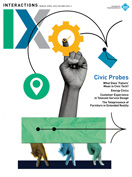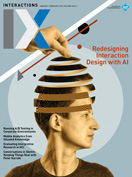Authors:
Gilbert Cockton, Simone Barbosa
Hello, who are you? Does our content meet your needs and wants as a reader? Oh, and what are your pain points? We hope we can make them better! In case we can't, perhaps you can. Helena Mentis and Mark Perry pay tribute to the many SIGCHI volunteers in their Community Square column—consider becoming one if you aren't already, and taking an even more active role in making what you want and need from us a reality.
As editors in chief, we can see how much each issue of Interactions meets our aims. Aligning the stories we tell with our increasingly diverse readership has been one of our top goals. There are more of you, and we want more especially for you. In this issue we have reading suggestions from Shaimaa Lazem in Egypt, a week in an African HCI Summer School, Abracadabra fabulation magic from the U.S., an overview of CSCW research from Latin America, a day in a Belgian lab, and how chord keys for mobile text input were made the U.K., before EXITing with bent nails from Germany.
Another of our aims has been to cover trends in HCI, UX, and IxD. On the technical side, AI has figured regularly over the past two years, with a new forum on the UX of AI coming in the next issue. In this issue, the Interaction Technologies forum presents a robotic receptionist. Innovative materials are a recurring focus, with a timely review of emerging opportunities in a feature by Isabel Qamar, Rainer Groh, David Holman, and Anne Roudaut. There will be more for you to craft as technology continues to develop.
Aligning the stories we tell with our increasingly diverse readership has been one of our top goals.
On the human side, the magazine is more regularly touching on political realities. The value-neutral stance of proper science is not always helpful. Our cover story for this issue by Andy Dow, Rob Comber, and John Vines explores the challenges of designing "middle out": being mindful of the political agendas of local government, bureaucrats, and citizen groups. Working with communities requires long-term engagements, which is becoming more common across HCI—Tariq Osman Andersen argues for large-scale and long-term co-design in the Health Matters forum. One clear trend over the past few years in Interactions has been responding to the challenges of scale. Elizabeth Churchill reflects on this in Ps and Qs, considering the challenge of scaling UX through the use of design systems.
Real HCI work gets done where the technical meets the human. This is becoming more daunting as the impact of digital technologies becomes global. In the Sustainability in (Inter)action forum, Lindsay Barbieri, Sonya Ahamed, and Sam Bliss draw our attention to the industrial scale of contemporary agriculture that technology has enabled. To address HCI at scale, Liam Friedland argues in the Business of UX forum that we need robust organizational UX cultures. We need to think big and build big. Jonathan Bean argues for thinking of trust as a collective good. The world needs more from you.
Our Special Topic on material culture and tangible interaction spans much of what is currently being asked of us in HCI. We must apply novel technologies, designing holistically for tangible interaction. We must bring multiple perspectives from content design, product design, and co-design when experimenting with the Internet of Things in heritage contexts. Demo Hour extends this Special Topic with four results of such experiments within the European meSch project. As a recently completed project, meSch involved new disciplines, new technologies, and new commitments. With more of them and more for them, more was expected from them. The bar keeps rising in HCI, but we can still jump over it.
Gilbert Cockton and Simone Barbosa [email protected]
Copyright held by authors
The Digital Library is published by the Association for Computing Machinery. Copyright © 2019 ACM, Inc.







Post Comment
No Comments Found